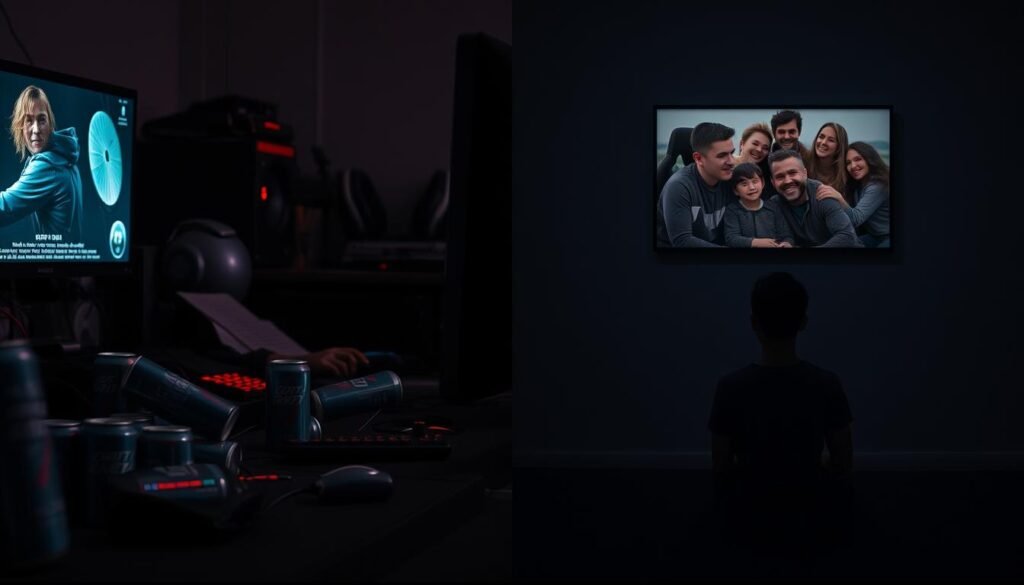10 Signs of Addiction to Online Gaming | Get Help Now
Studies show that up to 2% of kids and teens might have internet gaming disorder, or video game addiction. This problem has grown fast, affecting 0.3% to 1% of people in the U.S., Canada, U.K., and Germany. It’s a big issue worldwide.
Video game addiction is seen as a behavioral addiction by the American Psychiatric Association. It can deeply affect people, their families, and communities. Spotting the signs early is key to getting help and moving past this challenge.
SUFFERING FROM VIDEO GAME ADDICTION? CLICK HERE!
Key Takeaways
- Video game addiction, or internet gaming disorder, affects up to 2% of children and adolescents.
- An estimated 0.3% to 1% of the general population in certain countries may meet the criteria for this disorder.
- Addiction to online gaming can lead to significant personal and social impairment.
- Early recognition of the warning signs is critical for seeking the right help and support.
- Treatment options often include psychotherapy and, in severe cases, medication.
Understanding Gaming Addiction: A Modern Epidemic
The World Health Organization (WHO) has officially recognized gaming addiction as a mental health disorder. It’s called “Gaming Disorder” in the 11th revision of the International Classification of Diseases (ICD-11). This disorder is when someone can’t stop playing games, even if it hurts their life and relationships.
Definition and Classification by WHO
The WHO says gaming disorder is when someone can’t control their gaming. They put gaming first, even over important things like school or work. They keep gaming, even when it causes problems.
Current Statistics and Prevalence
Studies show 0.3% to 1% of people might have internet gaming disorder. In South Korea, it’s as high as 10%. Most people addicted are men, and most are white.
Also, 12% of gamers with addiction also have sleep problems. And 6% have depression.
Impact on Modern Society
Gaming addiction can hurt society a lot. It can cause health problems, like eye strain and bad posture. It can also lead to mental health issues, like anxiety and depression.
It can make people neglect their hygiene and sleep. It can also cause financial problems because of spending too much on games.
| Statistic | Value |
|---|---|
| Prevalence of gaming addiction in the general population | 0.3% to 1% |
| Addiction rates in South Korea | Up to 10% |
| Percentage of addicted gamers who are male | 94% |
| Percentage of addicted gamers who are white | 69% |
| Percentage of addicted gamers who experienced sleep disorders | 12% |
| Percentage of addicted gamers who correlated addiction with depression | 6% |
“Gaming addiction can have a significant impact on modern society, leading to a range of health issues, social isolation, and decreased productivity.”
The Science Behind Gaming Addiction
Video games trigger the brain’s reward system, releasing dopamine. This “feel-good” neurotransmitter makes gamers want to play more. But, too much dopamine can make the brain need more to feel good, leading to longer gaming sessions.
Dr. Daria J. Kuss and Dr. Mark D. Griffiths found that gaming addiction changes the brain. As people play more, their brains adapt. This can harm areas for memory, decision-making, and coordination, making gaming hard to stop.
Gaming addiction is also driven by the need for fulfillment. Video games meet needs like feeling competent and connected. This makes it hard for people to stop gaming.
“Gaming addiction involves structural changes in the brain, with high levels of video game immersion resulting in increased dopamine production and reduced dopamine sensitivity over time.”
Understanding gaming addiction’s science is key. It helps us see why it’s so hard to stop. By knowing how the brain and psychology work, we can find better ways to fight addiction. This leads to healthier lives and better well-being.
Common Misconceptions About Gaming Addiction
Gaming addiction is a complex issue that many people don’t fully understand. Some think all gaming is harmful or addictive. But, gaming can be a healthy hobby or even a career, like in esports. The important thing is to know the difference between healthy gaming and addiction.
Debunking Popular Gaming Myths
Many believe gaming is always a waste of time or that it’s impossible to be a “normal” gamer. But, this is not true. Millions enjoy gaming as a way to relax and have fun without it harming their lives. The issue comes when gaming becomes an obsession that interferes with daily life and well-being.
Understanding Risk Factors
Some people are more likely to become addicted to gaming due to certain risk factors. These include mental health issues like anxiety or depression, and social factors like the need for instant gratification. Also, gaming can affect sleep quality because of the blue light it emits.
Experts say around 700,000 to 1,000,000 people in the UK are addicted to gaming. This shows how important it is to understand gaming addiction and address it properly.
Differentiating Healthy Gaming from Addiction
To tell if gaming is healthy or addictive, look at its impact on your life. If it disrupts your daily routines, social life, and well-being, it might be addictive. But, if gaming is balanced and doesn’t interfere with other parts of your life, it can be harmless and fun.
By knowing the myths and facts about gaming addiction, you can make better choices about your gaming habits. Recognizing risk factors and getting professional help are key to tackling this issue and promoting healthier gaming.
signs-of-addiction-to-online-gaming/
The digital age has changed our lives a lot. Gaming addiction is now a big worry. It’s important to know the signs of gaming addiction to tackle this issue.
- Obsessive thoughts about gaming, to the point where it dominates one’s mind and time
- Inability to quit or cut down on gaming time, despite attempts to do so
- Using games as a coping mechanism to deal with negative emotions or escape from reality
- Continuing to game despite the negative consequences it has on personal, professional, or social life
- Neglecting personal hygiene, sleep, or other essential daily activities in favor of gaming
- Lying about the amount of time spent gaming or hiding gaming behavior from friends and family
- Experiencing withdrawal symptoms, such as irritability, mood swings, or even thoughts of self-harm, when unable to access games
These gaming addiction symptoms can mess up someone’s life, work, school, and relationships. People addicted to gaming might ignore their health for more gaming. It’s key to spot these warning signs of gaming addiction and get help before it gets worse.
Gaming addiction can harm both body and mind. It can cause problems like poor thinking, sleep issues, and less social interaction. If not treated, it can lead to serious mental health problems like anxiety, depression, and even self-harm thoughts.
If you or someone you know shows signs of gaming addiction, getting help is vital. With the right help and support, people can beat this addiction and live a healthier life.
Physical and Mental Health Consequences
Too much gaming can harm your body and mind. Long gaming sessions make you sit too much. This can cause sleep problems, headaches, and injuries to your hands and wrists.
A 2022 study in the Annals of Medicine and Surgery showed gaming addiction hurts sleep quality. It also makes it hard to function during the day.
Gaming addiction can also mess with your mental health. It can lead to more anxiety, depression, mood swings, and feeling unworthy. For college students, it can mean falling behind in school, missing out on social life, and money troubles.
- Gaming disorder can lead to social isolation, aggression, and physical or mental health problems.
- Prolonged gaming has been linked to mental health disorders, including depression, anxiety, and stress.
- Physical health problems that can arise from excessive gaming include obesity, back pain, carpal tunnel syndrome, and sleep disorders.
Video games are designed to keep you hooked, like addictive substances. Gamers may feel cravings, withdrawal, and can’t stop, even when it hurts. Getting help early is key. Treatments like cognitive-behavioral therapy (CBT), family therapy, and support groups can help gamers get better.
“College students are specially at risk for video game addiction. The open-ended nature of college life tempts students to spend more time gaming and less time attending classes or studying.”
Impact on Personal Relationships
Gaming addiction can harm personal relationships a lot. It makes people ignore their duties and friends. This leads to fights and poor communication at home.
People who are addicted to gaming often stop seeing friends and family. A 2018 study in the Iranian Journal of Public Health showed that loneliness grows with gaming addiction. This makes things worse.
SUFFERING FROM VIDEO GAME ADDICTION? CLICK HERE!
Professional Relationships
Gaming addiction also hurts work life. Not doing homework or work because of gaming can cause job loss or failing school. This damages professional relationships and future job chances.
| Relationship Impact | Percentage of Gamers Affected |
|---|---|
| Family Conflicts | 60% |
| Social Isolation | 75% |
| Professional Setbacks | 45% |
The table shows how gaming addiction affects personal relationships. It shows we need to help and support those struggling with it.

“Gaming addiction can tear families apart and leave individuals feeling increasingly isolated from the real world. It’s a significant problem that requires urgent attention and effective treatment solutions.”
Warning Signs for Parents and Partners
Gaming addiction is becoming more common. It’s important for parents and partners to know the signs. This way, they can spot the problem early and take action.
One key sign is spending too much time in the virtual world. People might ignore their personal care, duties, and friends for gaming. They can get upset or distant if they can’t play.
Parents should watch how much gaming their kids do. It should not get in the way of school, exercise, or social life. Setting limits and encouraging other activities helps keep things balanced. Partners might see their relationship suffer, feel less connected, and face money problems because of gaming.
Talking openly and being supportive is key when dealing with gaming addiction. Getting help from a counselor or therapist is also important. They can offer the right advice and tools to beat this addiction.
“The key is to create a supportive environment where the individual can find purpose and fulfillment outside of the virtual world.”
By spotting the signs and acting early, parents and partners can help gaming addicts. They can help them find a healthier path and improve their relationships.
Treatment Options and Professional Help
Getting over gaming addiction often needs help from experts and a mix of methods. Cognitive Behavioral Therapy (CBT) is a top choice. It helps change bad thoughts and actions linked to gaming addiction. CBT teaches better ways to cope and how to cut down on gaming.
Support groups also play a big role in fighting gaming addiction. They offer a place to meet others who face the same issues. Here, people find support, motivation, and a sense of belonging. It’s a safe place to share stories and learn from each other.
At times, medical help is needed to tackle mental health problems like depression or anxiety. These issues can make gaming addiction worse. Doctors might prescribe medicines to help manage these problems and support recovery.
It’s key to get professional help for gaming addiction. Look for a therapist who knows about behavioral addictions and fits your schedule and budget. SAMHSA’s treatment locator can help find the right help in your area.
Cognitive Behavioral Therapy Approaches
Cognitive Behavioral Therapy (CBT) is a top treatment for gaming addiction. It focuses on changing bad thoughts and actions that lead to gaming addiction. Through CBT, people learn new ways to cope, reducing their need for gaming.
Support Group Benefits
Being part of a gaming addiction support group is very helpful. These groups offer a community, support, and shared experiences. They help break the addiction cycle. People learn from each other’s journeys and get the push to keep moving towards a healthier life.
Medical Interventions
Medical help might be needed for mental health issues that lead to gaming addiction. Doctors might give medicines like antidepressants or anti-anxiety drugs. These can help stabilize the mind and support recovery. Working with a mental health expert is important to find the right treatment.

Prevention Strategies and Self-Help Techniques
It’s important to prevent gaming addiction and keep gaming habits healthy in today’s world. By using proactive steps and self-help methods, people can balance their love for gaming with their well-being.
Setting strict time limits for gaming is a key prevention method. Kids should not spend more than two hours a day on screens, including games. For those struggling with addiction, start with 30 minutes a day and slowly increase it as you get better at controlling yourself.
Having a special gaming area outside your bedroom can also help. It keeps gaming time in check and improves sleep. This way, you can separate your gaming life from your personal space.
- Find other activities and hobbies to replace too much gaming, like exercise, reading, or hanging out with friends.
- Deal with any issues like stress, anxiety, or depression that might make you game too much.
- If you can’t manage gaming addiction on your own, get help from a mental health expert.
Being proactive about preventing gaming addiction and keeping gaming habits healthy can greatly improve your life. It leads to better physical and mental health, stronger relationships, and a more balanced life. By taking these steps, you can enjoy gaming without falling into addiction.
| Prevention Strategy | Key Benefits |
|---|---|
| Strict time limits on gaming | Improved self-control, better sleep, and balanced lifestyle |
| Dedicated gaming area outside the bedroom | Boundary between gaming and personal life, better sleep quality |
| Finding alternative activities and hobbies | Reduced gaming time, improved physical and mental well-being |
| Addressing underlying issues | Addressing root causes of addictive gaming behavior |
| Seeking professional help | Effective treatment and support for gaming addiction |
“Gaming addiction can have serious consequences and may lead to mental health issues. Taking proactive steps to prevent it is critical for a healthy, balanced life.”
Recovery Success Stories and Support Resources
Beating gaming addiction is tough but worth it. There are many support resources to help on this journey. Let’s look at some real-life recovery examples and the support networks that help.
Real-life Recovery Examples
James, 27 from California, fought gaming addiction for years. “I played online games for 8 hours a day, ignoring school and friends,” he says. “Seeking help and joining a support group changed my life.” With therapy and group support, James learned to control his gaming.
SUFFERING FROM VIDEO GAME ADDICTION? CLICK HERE!
Sarah, 19 from Texas, also found her way. “Gaming controlled my life, causing school failure and social isolation,” she remembers. “A gaming addiction recovery program helped me find balance and new interests. It’s a journey, but I’m healthier now.”
Available Support Networks
- Online forums like the r/StopGaming subreddit offer support for gaming addiction.
- Local support groups, led by mental health experts, provide a space for gaming addicts to share and get support.
- The Substance Abuse and Mental Health Services Administration (SAMHSA) has a 24/7 Helpline at 1-800-662-4357. It connects people with treatment options for gaming addiction.
Ongoing Management Strategies
Recovering from gaming addiction is a long-term effort. It needs a balanced lifestyle, ongoing therapy or group meetings, and healthy coping skills. These steps help individuals take back their lives and achieve lasting recovery.
Conclusion
Gaming addiction is a serious issue that needs many solutions. To beat it, we must first understand it. Knowing the signs and getting help are key steps.
It’s not just about cutting down on gaming. It’s about finding balance in life. This means setting limits and finding other activities to enjoy.
Recovery is possible with the right help. This includes therapy, support groups, and self-care. These tools help people manage their addiction and live better lives.
More awareness and support are needed to tackle this problem. We must help each other and support those who are struggling. This way, we can all live healthier lives.
Let’s work together to make gaming a positive part of our lives. We can do this by being mindful and seeking help when needed. Together, we can overcome addiction and enjoy gaming in a healthy way.






